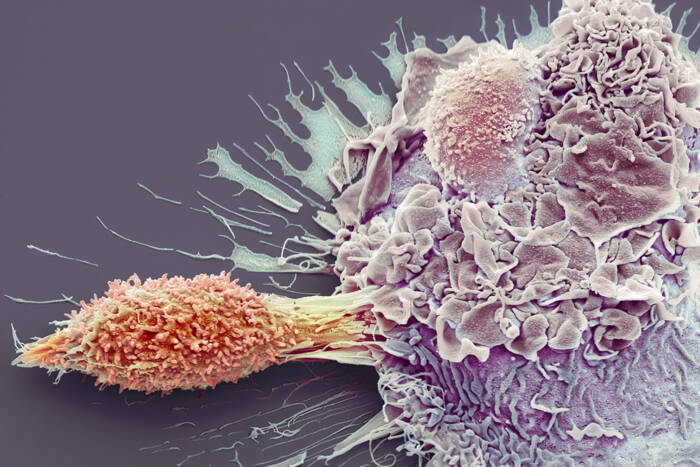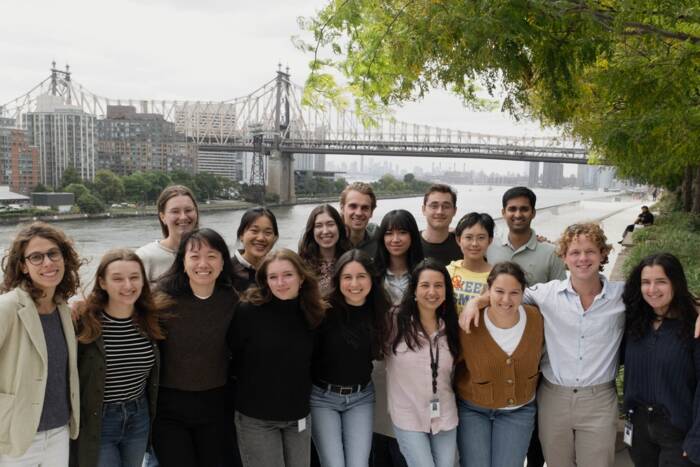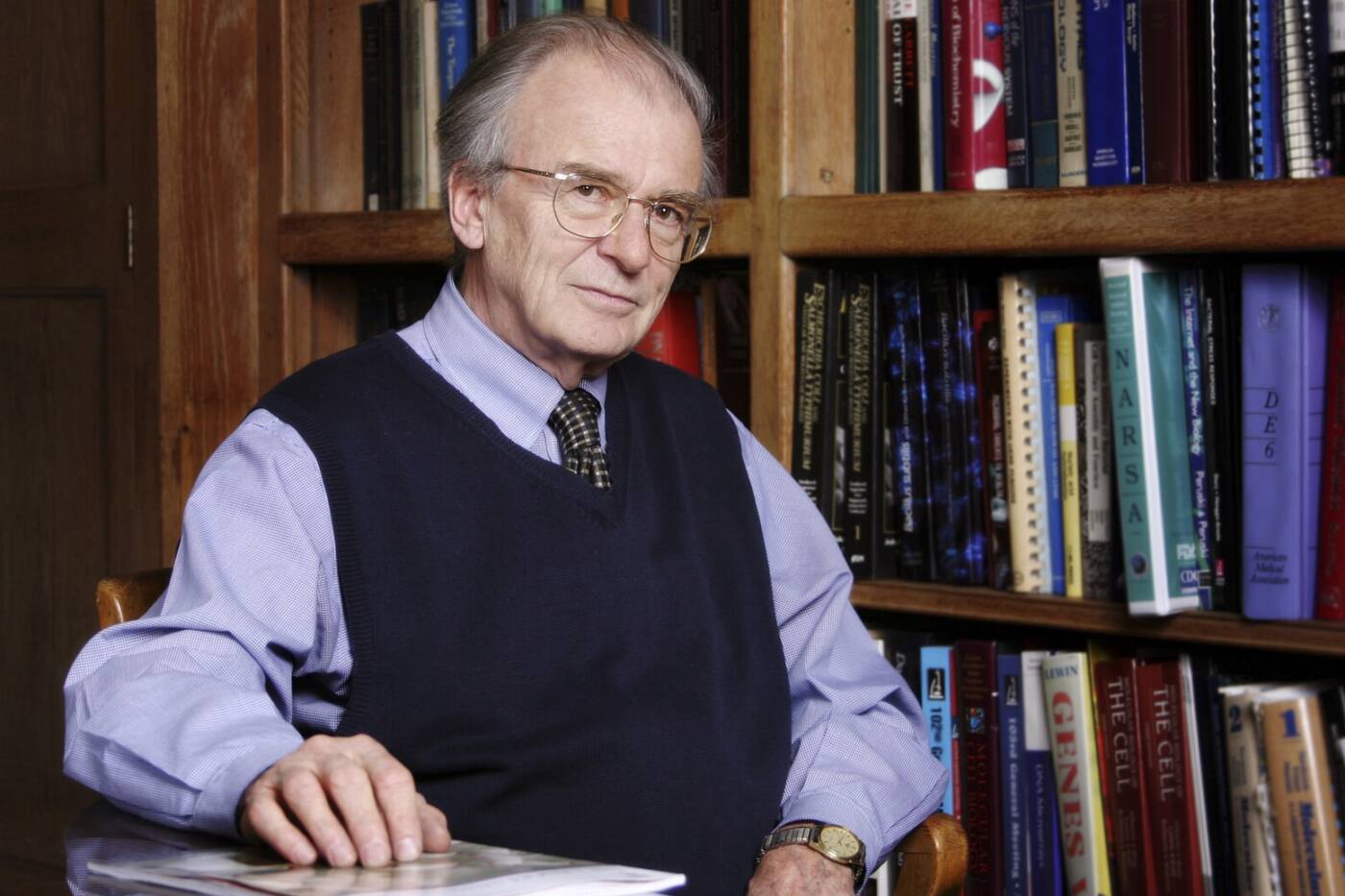David Rockefeller pledges $100 million to Rockefeller University
Largest gift in University’s history will support innovative science, graduate program
New York, NY, June 9, 2005 — Paul Nurse, Ph.D., president of The Rockefeller University, announced today that David Rockefeller, honorary chairman and life trustee of the University’s Board of Trustees, has pledged $100 million to the University, the largest gift in its history. The gift will support the University’s world-renowned, innovative approach to science that has resulted in many of the most important biomedical discoveries of the last 100 years and has garnered a host of honors for its scientists, who over the years have received 23 Nobel Prizes.

Rockefeller University President Paul Nurse (left) and David Rockefeller, honorary chairman and life trustee.
President Nurse said, “For 65 years, David has been an inspirational leader and benefactor of The Rockefeller University. His extraordinary new gift will allow the University to continue in the 21st century its unique and highly successful approach to research that has already, despite the University’s small size, brought revolutionary breakthroughs in science.”
The University’s graduate program will be named the David Rockefeller Graduate Program in recognition of Mr. Rockefeller’s dedication to the University and his long-time commitment to the graduate program. President Nurse said, “David was central to the founding of our graduate program 50 years ago, and it is now one of the best in the world. It is very fitting that the program will now proudly bear his name.
“This gift allows us to expand the opportunities for training the next generation of scientists and encourage students to tackle complex biomedical problems, including those diseases that continue to plague global populations,” said President Nurse.
Mr. Rockefeller said, “For more than a century, Rockefeller University has fulfilled the mission that my grandfather and father had envisioned, to produce the discoveries that would benefit humankind. In the process, it has become one of the world’s great medical research institutions.
“Having played a small part in Rockefeller University’s expansion and revitalization in the 20th century, I am delighted to be able to support its continued innovation and study with this pledge, and hope that it will encourage others to support the University’s efforts to answer the most critical health-related questions of the 21st century — such as cancer, HIV/AIDS and tuberculosis,” Mr. Rockefeller said.
Russell L. Carson, chairman of the University’s Board of Trustees, said, “David’s generous gift will enable us to stay on the cutting edge of scientific breakthroughs in areas such as genomics, stem cell research, aging, and efforts to understand how the brain works. His extraordinary stewardship has impacted every aspect of this great University from its landscape and buildings, its art collection and housing to its scientific programs and educational outreach.”
The University will use $30 million of Mr. Rockefeller’s gift to help support its newly named David Rockefeller Graduate Program.
Part of this gift will create new opportunities for the institution’s graduate students in areas relating to global health. Nearly 20 University laboratories are studying problems related to infectious diseases responsible for high mortality rates worldwide. These include HIV/AIDS, tuberculosis, SARS, hepatitis C, Chagas disease, malaria and cholera, as well as others.
The University plans to use $70 million of the gift to aid in the restoration of laboratory buildings, and to support research, on the North side of the University’s campus.
“These buildings, which date back to the first decades of the University’s existence, will be modernized to provide new interactive space that will attract tomorrow’s leaders in science,” said President Nurse.
David Rockefeller and The Rockefeller University
The Rockefeller University was founded in 1901 by Mr. Rockefeller’s grandfather, John D. Rockefeller, as The Rockefeller Institute for Medical Research — the nation’s first biomedical research institution. John D. Rockefeller’s son, John D. Rockefeller Jr., was on the Board of Trustees of The Rockefeller Institute from its beginning until 1954, and he headed the Board for 21 years. In 1950, John D. Rockefeller Jr. said he always had regarded the Institute as “the most significant and the most permanent of any [institution] that my father established.”
David Rockefeller joined the Board of Trustees in 1940 and, in 1950, succeeded his father, John D. Rockefeller Jr., as chairman of the Board, a position he held until 1975. He chaired the Board’s Executive Committee from 1975 to 1995, when he was named honorary chairman and life trustee. In 1980, the University awarded David Rockefeller an honorary doctor of laws degree.
In the 1950s, working with then-President Detlev W. Bronk, David Rockefeller led the expansion of the research institute to include a biomedical graduate university. The first class of Ph.D.s graduated in 1959 and the institution was renamed The Rockefeller University in 1965.
The University gives two awards in honor of Mr. Rockefeller’s commitment to scientific research and training. Since 1998, the University has presented annually The David Rockefeller Fellowship to an outstanding third-year graduate student who demonstrates exceptional promise as a scientist and as a leader. The award was established in 1995 by the University’s alumni on the occasion of Mr. Rockefeller’s 80th birthday to express their enormous admiration and respect for him and appreciation of his vital role in creating the Ph.D. program at the University. The Fellowship provides a one-year stipend and a monetary prize.
The David Rockefeller Award for Extraordinary Service to The Rockefeller University recognizes an individual from the University’s community who exemplifies the commitment to the institution made by Mr. Rockefeller. Mr. Rockefeller himself received the first David Rockefeller Award in June 1995, in recognition of his distinguished service on the University’s Board of Trustees.
In 2001, the University established the David Rockefeller Professorship, currently held by Barry S. Coller, M.D., physician-in-chief at The Rockefeller University Hospital.
Understanding life for the benefit of humanity
Paul Nurse joined Rockefeller University as its ninth President in September 2003. President Nurse has been leading the University into the 21st century by reconnecting with the institution’s founding vision of understanding life for the benefit of humanity and strengthening the elements of the University that have contributed to its uniqueness and scientific pre-eminence. Among these elements are a faculty composed of the best and most creative scientists in the world, a research environment that provides these scientists with the support they need to do imaginative science, a high quality research hospital, and a truly international graduate program that is unmatched for the freedom and resources it provides students to develop their capacities for innovative research.
The University recruits the best students regardless of citizenship. Half of its students are from countries other than the United States; 42 different countries are currently represented in the graduate program. Graduate enrollment has increased substantially in the last five years, from 151 students in 2000 to 193 in 2004. Each graduate student receives free tuition, a stipend and a research allowance.
Since the institution’s founding in 1901, Rockefeller University has been the site of many important scientific breakthroughs. Rockefeller scientists, for example, established that DNA is the chemical basis of heredity, discovered blood groups, showed that viruses can cause cancer, founded the modern field of cell biology, worked out the structure of antibodies, developed methadone maintenance for people addicted to heroin, devised the AIDS “cocktail” drug therapy, and identified the weight-regulating hormone leptin.


